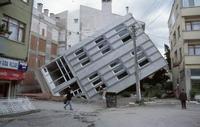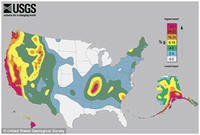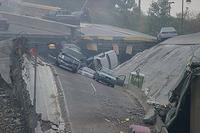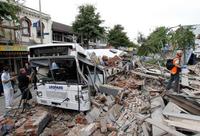-
Identifying potential pre-quake signals
Changes in seismic velocity — changes in the speeds at which seismic waves move through the Earth’s crust — have been identified during and after many earthquakes; do these changes also happen before an earthquake, and could they be measured as a way to predict a quake on the way?
-
-
Are large earthquakes linked across the globe?

The past decade has been plagued with what seems to be a cluster of large earthquakes, with massive quakes striking Sumatra, Chile, Haiti, and Japan since 2004; some researchers have suggested that this cluster has occurred because the earthquakes may be “communicating” across large distances, possibly triggering each other; a new analysis, however, that the cluster could just as well be the result of random chance
-
-
Earthquake risk looms large in the Pacific Northwest

A comprehensive analysis of the Cascadia Subduction Zone off the Pacific Northwest coast confirms that the region has had numerous earthquakes over the past 10,000 years, and suggests that the southern Oregon coast may be most vulnerable based on recurrence frequency
-
-
Earth’s oceans, ecosystems still absorbing about half the greenhouse gases emitted by people
Earth’s oceans, forests, and other ecosystems continue to soak up about half the carbon dioxide emitted into the atmosphere by human activities, even as those emissions have increased, according to a study published yesterday in the journal Nature
-
-
New, affordable instant warnings of bridge collapse

The Federal Bureau of Transportation lists nearly 70,000 U.S. bridges as “structurally deficient,” requiring extra surveillance; in addition, more than 77,000 others are categorized as “obsolete” — exceeding their intended lifespan and carrying loads greater than they were designed to handle; researchers developed a new technology for monitoring these 150,000 aging U.S. highway bridges
-
-
Radiation detection equipment installed in four Mexican ports
The Megaports Initiative is a U.S. Department of Energy program intended to enhance the ability of ports around the world to detect and interdict illicit shipments of special nuclear and other radioactive materials; Under the initiative, radiation detection gear and protocols were implemented in the Mexican ports of Manzanillo, Altamira, Lazaro Cardenas, and Veracruz, through which 92 percent of Mexico’s containerized cargo pass
-
-
Raytheon's Space Fence technology tracks space debris

Space debris threatens systems the U.S. military and economy depend on every day, including satellites that power navigation, weather and critical infrastructures; the Space Fence program is capable of detecting more and much smaller objects in low earth orbit
-
-
Measuring DHS effectiveness monitoring chemical plant safety standards
The events of 9/11 triggered a national re-examination of the security of facilities that use or store hazardous chemicals in quantities which, in the event of a terrorist attack, could put large numbers of Americans at risk of serious injury or death; the GAO issued a report on how DHS ensures compliance with chemical facilities security standards
-
-
The five biggest stories at Black Hat
The annual Black Hat Briefings conference, held last week in Las Vegas, is the world’s biggest, and arguably the most important, gathering of security researchers; here are the five biggest stories to take away from last week’s Black Hat meeting in Las Vegas
-
-
Global warming unequivocal in its advance, says NCAA expert
Global warming is unequivocal in its advance and will lead to more record-setting temperatures, says Warren Washington, a senior scientist at the National Center for Atmospheric Research; in a talk at Sandia Lab, Washington presented graph after graph showing how various atmospheric processes have combined to create stronger rainfall near the equator and more intense droughts in the subtropics, as well as sea-level rises and increased storm surges
-
-
Predictions by climate models are flawed, says MIT meteorology expert
Massachusetts Institute of Technology professor Richard Lindzen, a global warming skeptic, says that too much is being made of climate change by researchers seeking government funding; he said their data and their methods did not support their claims; for thirty years, climate scientists have been “locked into a simple-minded identification of climate with greenhouse-gas level. That climate should be the function of a single parameter (like CO2) has always seemed implausible. Yet an obsessive focus on such an obvious oversimplification has likely set back progress by decades,” Lindzen said
-
-
Large, magnitude 8 earthquakes hit New Zealand with regularity

A new study finds that very large earthquakes have been occurring relatively regularly on the Alpine Fault along the southwest coastline of New Zealand for at least 8,000 years
-
-
Studying the physics of avalanches

Snow avalanches, a real threat in countries from Switzerland to Afghanistan, are fundamentally a physics problem: What are the physical laws that govern how they start, grow, and move, and can theoretical modeling help predict them? New study offers answers
-
-
Game lets players try their hand at computer security
A new game — Control-Alt-Hack — gives teenage and young-adult players a taste of what it means to be a computer-security professional defending against an ever-expanding range of digital threats; the game’s creators will present it this week in Las Vegas at Black Hat 2012; educators in the continental United States can apply to get a free copy of the game while supplies last; it is scheduled to go on sale in the fall for a retail price of about $30
-
-
Northrop Grumman delivers Nationwide AIS to Coast Guard
Northrop Grumman has delivered its Nationwide Automatic Identification System (AIS) to the Coast Guard; the system provides a more comprehensive view of vessels bound for and navigating within U.S. ports and waterways
-
- All
- Regional
- Water
- Biometrics
- Borders/Immig
- Business
- Cybersecurity
- Detection
- Disasters
- Government
- Infrastructure
- International
- Public health
- Public Safety
- Communication interoperabillity
- Emergency services
- Emergency medical services
- Fire
- First response
- IEDs
- Law Enforcement
- Law Enforcement Technology
- Military technology
- Nonlethal weapons
- Nuclear weapons
- Personal protection equipment
- Police
- Notification /alert systems
- Situational awareness
- Weapons systems
- Sci-Tech
- Sector Reports
- Surveillance
- Transportation
Advertising & Marketing: advertise@newswirepubs.com
Editorial: editor@newswirepubs.com
General: info@newswirepubs.com
2010-2011 © News Wire Publications, LLC News Wire Publications, LLC
220 Old Country Road | Suite 200 | Mineola | New York | 11501
Permissions and Policies
Editorial: editor@newswirepubs.com
General: info@newswirepubs.com
2010-2011 © News Wire Publications, LLC News Wire Publications, LLC
220 Old Country Road | Suite 200 | Mineola | New York | 11501
Permissions and Policies
